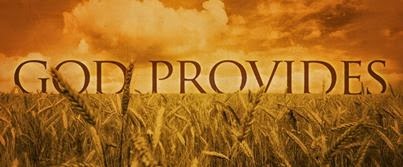A drought had made food scarce in
Israel. Elijah the prophet had been fed by ravens, but God had a new
command: Go to a widow in Zarephath.
She would supply the need.
Elijah did, and though the woman was preparing to die of hunger, God
miraculously provided enough for her, her son, and the prophet.
Have you ever wondered why God told
the prophet to go to a woman who had nothing? She was no source of great
wealth, no prominent benefactor. She was about to make her last meal so
that she and her son could then die. But God's providence comes in barren
places, and the woman learned a valuable principle:
Obey God first, even when He asks
for your last meal. Then your supply is up to Him.
The deep principles of providence
kick in after we have demonstrated a greater desire to invest in obedience than
to invest in ourselves. The greatest inflow of providence comes when we
determine that nothing will hinder our outflow to Him and His Kingdom.
God is looking for those who will
do what He says before fulfilling their own desperate plans - just as the widow
of Zarephath gave Elijah what she thought might be her last meal.
At what point have we stopped
giving to God? That is the point where God will demonstrate the futility
of our plans - not because He enjoys frustrating us, but because He has greater
plans for His people than our self-preserving instincts will allow.
The miraculous flow of His providence
is only miraculous to us when it seems unlikely. Our hour of greatest
need is His hour of greatest supply. A Phoenician widow survived a famine
on that principle. So can we.
The jar of flour will not be used up
and the jug of oil will not run dry until the day the Lord gives rain on the land. -I Kings 17:14
Yours sincerely,
A long-time Oasis member


No comments:
Post a Comment